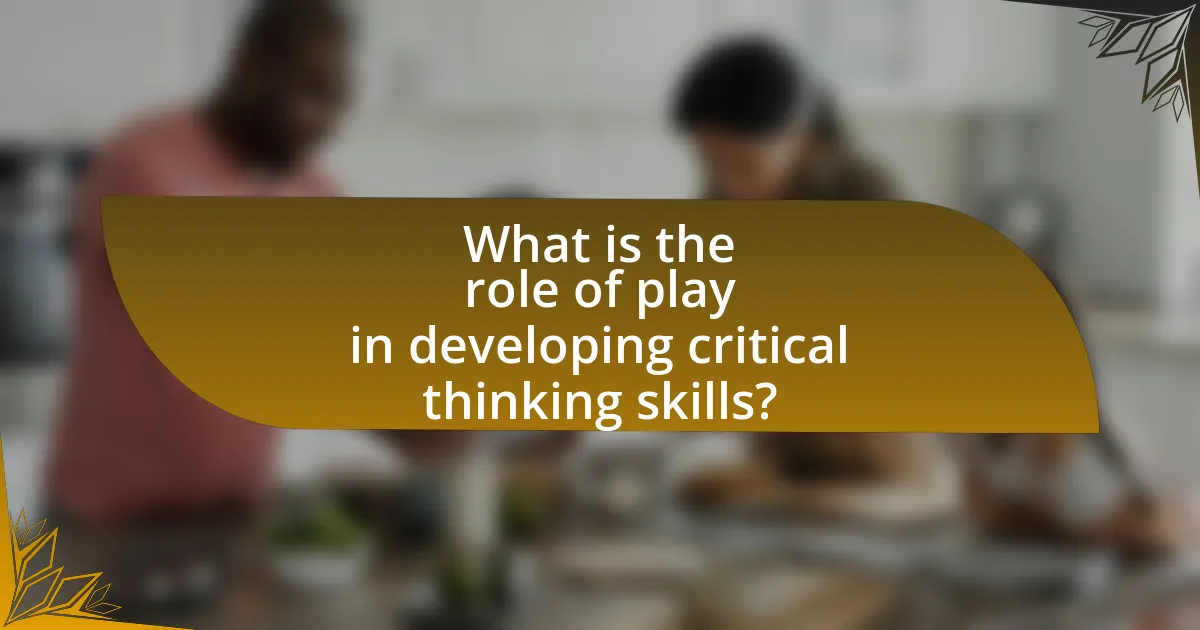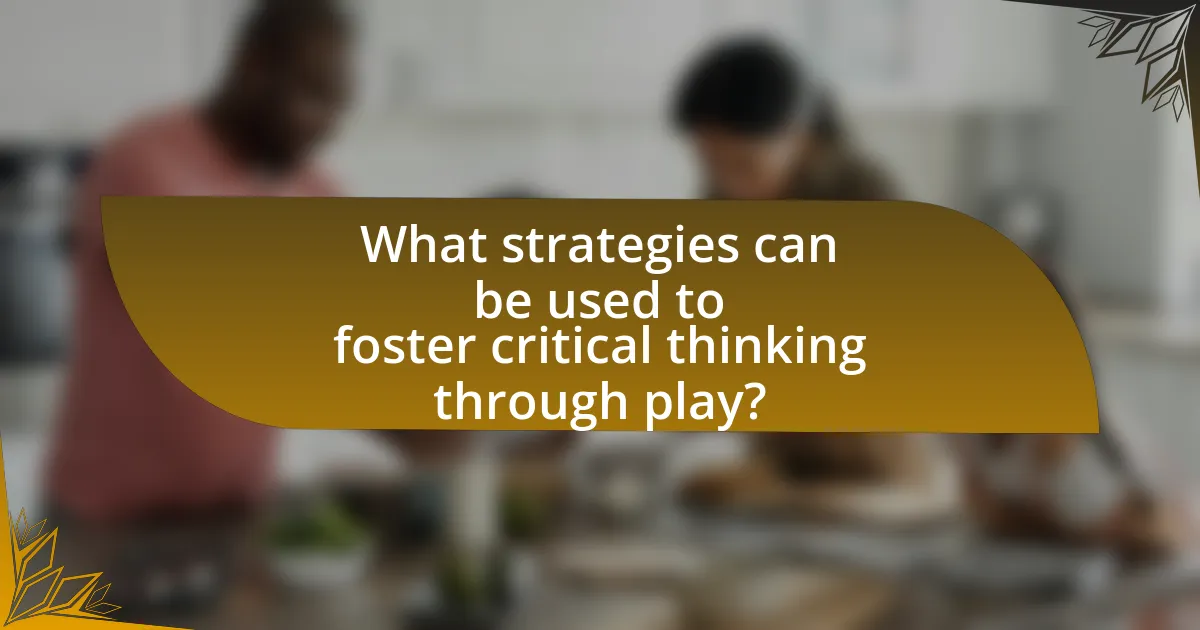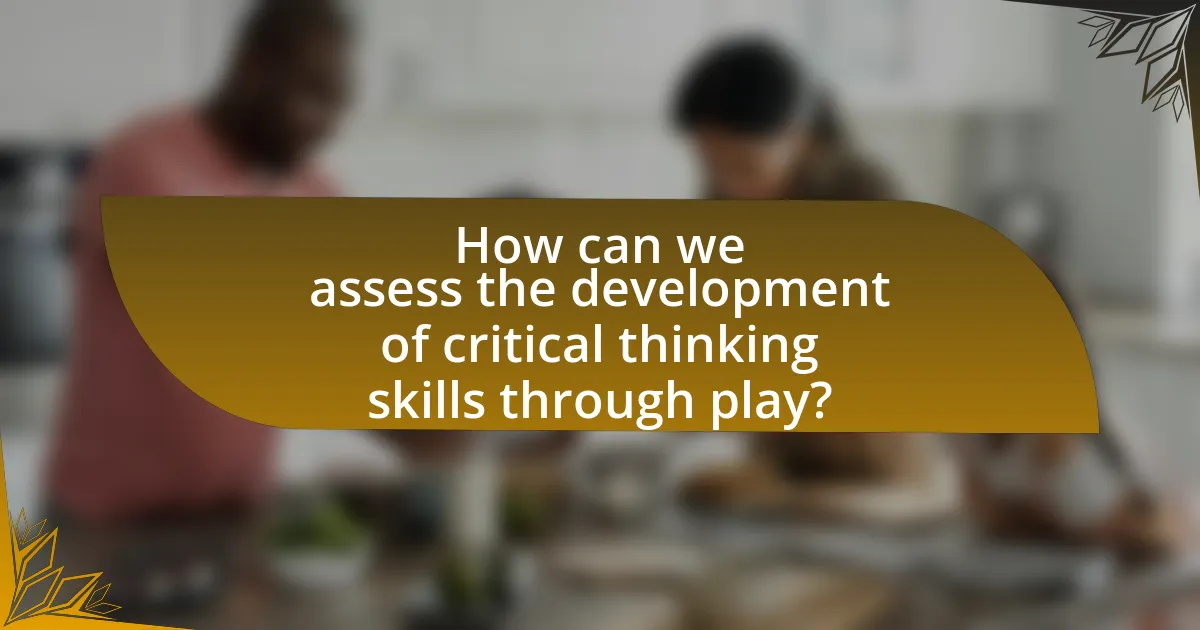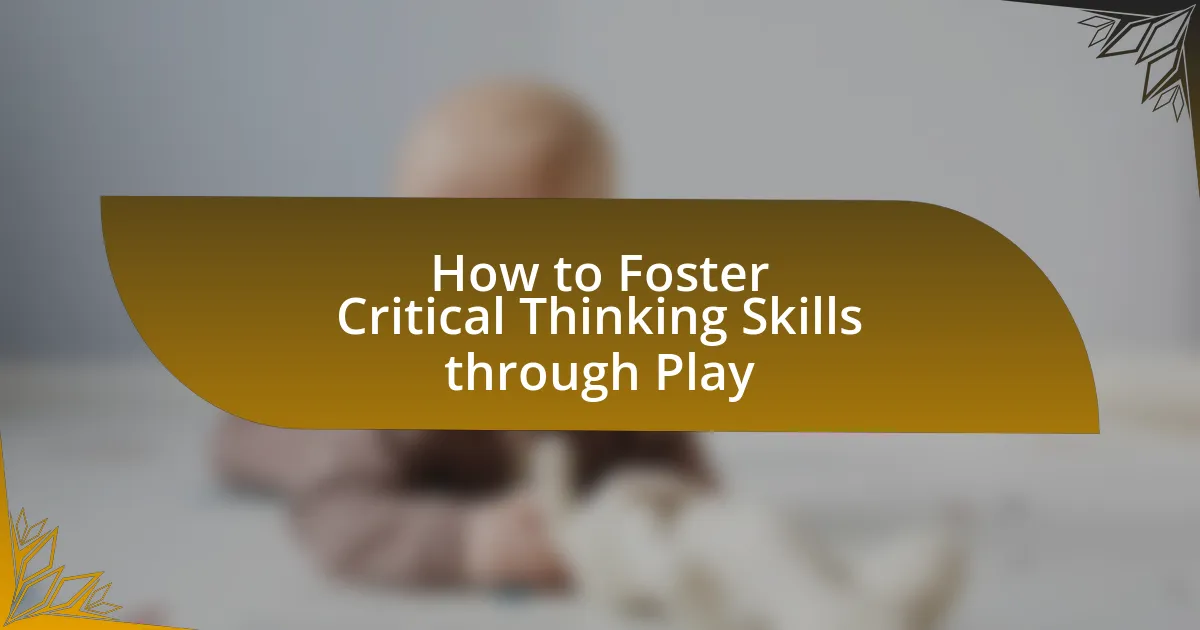The article focuses on the importance of play in fostering critical thinking skills, particularly in children. It outlines how play serves as a mechanism for problem-solving, creativity, and decision-making, enhancing cognitive development through various types of play, such as role-playing and strategic games. The article discusses the long-term benefits of critical thinking, its impact on academic performance, and strategies for parents and educators to create play environments that encourage critical thinking. Additionally, it highlights the role of observation and assessment tools in evaluating critical thinking development during play activities.

What is the role of play in developing critical thinking skills?
Play serves as a fundamental mechanism for developing critical thinking skills by providing opportunities for problem-solving, creativity, and decision-making. Engaging in play allows individuals, particularly children, to explore scenarios, test hypotheses, and learn from the outcomes of their actions. Research indicates that play-based learning environments enhance cognitive flexibility and promote analytical thinking, as children navigate challenges and collaborate with peers. For instance, a study by Fisher et al. (2011) published in the journal “Child Development” found that children who participated in structured play activities demonstrated improved reasoning skills compared to those who did not. This evidence underscores the significant role of play in fostering critical thinking abilities.
How does play facilitate cognitive development?
Play facilitates cognitive development by providing children with opportunities to explore, experiment, and solve problems in a safe environment. Engaging in play enhances critical thinking skills as children navigate challenges, make decisions, and learn from their experiences. Research indicates that play-based learning promotes cognitive flexibility, creativity, and the ability to think abstractly, which are essential components of cognitive development. For instance, a study published in the journal “Child Development” by researchers from the University of California found that children who participated in structured play activities demonstrated improved problem-solving skills and higher levels of cognitive engagement compared to those who did not.
What types of play are most effective for enhancing critical thinking?
Types of play that are most effective for enhancing critical thinking include role-playing, problem-solving games, and strategic board games. Role-playing allows individuals to explore different perspectives and scenarios, fostering empathy and analytical skills. Problem-solving games, such as puzzles and escape rooms, challenge players to think critically and develop solutions under time constraints. Strategic board games, like chess or Settlers of Catan, require players to plan, anticipate opponents’ moves, and make decisions based on limited information, which sharpens critical thinking abilities. Research indicates that engaging in these types of play can significantly improve cognitive flexibility and reasoning skills, essential components of critical thinking.
How does imaginative play contribute to problem-solving abilities?
Imaginative play enhances problem-solving abilities by allowing children to explore scenarios, experiment with solutions, and develop critical thinking skills. During imaginative play, children engage in role-playing and storytelling, which encourages them to think creatively and consider multiple perspectives. Research indicates that this type of play fosters cognitive flexibility, enabling children to adapt their strategies when faced with challenges. For instance, a study published in the journal “Child Development” by researchers at the University of California found that children who participated in imaginative play demonstrated improved problem-solving skills in tasks requiring innovative thinking. This evidence supports the notion that imaginative play is a vital component in developing effective problem-solving abilities.
Why is critical thinking important for children?
Critical thinking is important for children because it equips them with the ability to analyze information, make informed decisions, and solve problems effectively. This skill fosters independence and creativity, enabling children to navigate complex situations and understand diverse perspectives. Research indicates that children who engage in critical thinking activities perform better academically and develop stronger reasoning skills, which are essential for lifelong learning and adaptability in an ever-changing world. For instance, a study published in the Journal of Educational Psychology found that critical thinking skills significantly correlate with academic success, highlighting the necessity of nurturing these abilities from a young age.
What are the long-term benefits of fostering critical thinking skills?
Fostering critical thinking skills leads to enhanced problem-solving abilities, improved decision-making, and greater adaptability in complex situations. Individuals who develop these skills are better equipped to analyze information, evaluate arguments, and make informed choices, which is crucial in both personal and professional contexts. Research indicates that critical thinking is linked to academic success; for instance, a study published in the Journal of Educational Psychology found that students who engage in critical thinking exercises perform better academically over time. Additionally, critical thinkers are more likely to navigate challenges effectively, as they can assess risks and benefits, leading to increased resilience in the face of adversity.
How does critical thinking impact academic performance?
Critical thinking significantly enhances academic performance by enabling students to analyze information, evaluate evidence, and solve problems effectively. Research indicates that students who engage in critical thinking demonstrate improved comprehension and retention of material, leading to higher grades and better overall academic outcomes. For instance, a study published in the Journal of Educational Psychology found that students who participated in critical thinking exercises scored, on average, 20% higher on standardized tests compared to those who did not. This correlation underscores the importance of fostering critical thinking skills in educational settings to promote academic success.

What strategies can be used to foster critical thinking through play?
Engaging children in open-ended play is a key strategy to foster critical thinking. Open-ended play allows children to explore, experiment, and make decisions without predetermined outcomes, encouraging them to think creatively and solve problems. For instance, activities like building with blocks or role-playing scenarios require children to plan, hypothesize, and evaluate their actions, which enhances their analytical skills. Research by the American Academy of Pediatrics highlights that play-based learning significantly contributes to cognitive development, as it promotes inquiry and reasoning skills essential for critical thinking.
How can parents and educators create play environments that encourage critical thinking?
Parents and educators can create play environments that encourage critical thinking by incorporating open-ended activities that promote exploration and problem-solving. For instance, providing materials such as building blocks, art supplies, or puzzles allows children to engage in creative thinking and experimentation. Research indicates that environments rich in diverse, hands-on materials stimulate cognitive development and enhance critical thinking skills. A study by the National Association for the Education of Young Children highlights that children who engage in play-based learning demonstrate improved reasoning and analytical skills. By fostering a space where questioning and curiosity are encouraged, parents and educators can effectively nurture critical thinking through play.
What role do open-ended questions play in guided play?
Open-ended questions play a crucial role in guided play by encouraging children to think critically and express their thoughts creatively. These questions stimulate exploration and discussion, allowing children to engage deeply with the play experience. Research indicates that when children are prompted with open-ended questions, such as “What do you think will happen if we add more blocks?” they are more likely to analyze situations, make predictions, and develop problem-solving skills. This interaction not only enhances cognitive development but also fosters communication skills, as children articulate their reasoning and ideas.
How can collaborative play enhance critical thinking skills?
Collaborative play enhances critical thinking skills by promoting problem-solving, communication, and perspective-taking among participants. Engaging in group activities requires individuals to analyze situations, evaluate different viewpoints, and negotiate solutions collectively. Research indicates that children who participate in collaborative play demonstrate improved cognitive flexibility and the ability to approach problems from multiple angles, which are key components of critical thinking. For instance, a study published in the journal “Child Development” by G. M. Smith and colleagues found that children involved in cooperative games showed significant gains in reasoning and decision-making skills compared to those who played alone.
What types of games and activities promote critical thinking?
Games and activities that promote critical thinking include strategy board games, puzzles, role-playing games, and problem-solving activities. Strategy board games like chess and Settlers of Catan require players to analyze situations, anticipate opponents’ moves, and make decisions based on limited information. Puzzles, such as Sudoku and logic puzzles, challenge individuals to think logically and systematically to find solutions. Role-playing games, including Dungeons & Dragons, encourage creative problem-solving and collaboration, as players must navigate complex scenarios and make strategic choices. Problem-solving activities, such as escape rooms, require participants to work together to solve challenges, fostering teamwork and critical analysis. Research indicates that engaging in these types of games enhances cognitive skills, as they require players to evaluate options, make judgments, and reflect on their decisions.
Which board games are best for developing strategic thinking?
Chess is one of the best board games for developing strategic thinking. It requires players to anticipate their opponent’s moves, plan several steps ahead, and adapt their strategies based on the evolving game state. Research indicates that playing chess enhances cognitive skills, including problem-solving and critical thinking, as evidenced by a study published in the journal “Intelligence” which found that chess players exhibit higher levels of cognitive ability compared to non-players. Other notable games that foster strategic thinking include Go, which emphasizes territory control and long-term planning, and Settlers of Catan, which encourages resource management and negotiation skills. These games collectively promote strategic thought processes essential for effective decision-making.
How can role-playing games enhance decision-making skills?
Role-playing games enhance decision-making skills by immersing players in complex scenarios that require critical thinking and strategic planning. In these games, participants must evaluate multiple options, consider potential consequences, and make choices that affect the game’s outcome. Research indicates that engaging in role-playing games can improve cognitive flexibility, as players learn to adapt their strategies based on evolving situations and the actions of other players. A study published in the journal “Computers in Human Behavior” by researchers from the University of Southern California found that role-playing games significantly enhance problem-solving abilities and decision-making processes by fostering an environment where players must think critically and collaboratively.

How can we assess the development of critical thinking skills through play?
Assessing the development of critical thinking skills through play can be achieved by observing children’s problem-solving abilities, decision-making processes, and their capacity to analyze situations during play activities. Structured play scenarios, such as role-playing or strategy games, provide opportunities to evaluate how children approach challenges, articulate their reasoning, and adapt their strategies based on outcomes. Research indicates that children who engage in play that requires negotiation and collaboration demonstrate enhanced critical thinking skills, as they must consider multiple perspectives and consequences of their actions. For example, a study by Bodrova and Leong (2007) highlights that guided play fosters cognitive development, including critical thinking, by allowing children to explore and reflect on their experiences in a supportive environment.
What indicators show improvement in critical thinking during play?
Indicators that show improvement in critical thinking during play include enhanced problem-solving abilities, increased questioning and inquiry, and greater adaptability to new situations. Enhanced problem-solving abilities manifest when children demonstrate the capacity to analyze scenarios, evaluate options, and make informed decisions during play activities. Increased questioning and inquiry are evident when children actively seek information, ask open-ended questions, and engage in discussions about their play experiences. Greater adaptability is observed when children adjust their strategies in response to challenges or changes in the play environment. Research supports these indicators, as studies have shown that play-based learning environments foster cognitive development and critical thinking skills in children, highlighting the importance of interactive and exploratory play in enhancing these abilities.
How can observation be used to evaluate critical thinking skills?
Observation can be used to evaluate critical thinking skills by systematically assessing an individual’s ability to analyze, synthesize, and apply information during problem-solving activities. Through observation, evaluators can identify behaviors such as questioning, reasoning, and decision-making processes that indicate critical thinking. For instance, studies show that educators can observe students engaging in play-based learning scenarios, where they demonstrate critical thinking by exploring solutions, making predictions, and reflecting on outcomes. This method provides concrete evidence of a student’s cognitive processes in real-time, allowing for a more accurate assessment of their critical thinking abilities.
What tools are available for assessing critical thinking in children?
Tools available for assessing critical thinking in children include the Watson-Glaser Critical Thinking Appraisal, the California Critical Thinking Skills Test, and the Ennis-Weir Critical Thinking Essay Test. The Watson-Glaser test evaluates critical thinking through scenarios requiring analysis and inference, while the California test measures skills such as analysis, evaluation, and inference through multiple-choice questions. The Ennis-Weir test assesses critical thinking through essay responses, focusing on argument analysis and reasoning. These tools are validated through extensive research in educational psychology, demonstrating their effectiveness in measuring critical thinking abilities in children.
What are some common challenges in fostering critical thinking through play?
Common challenges in fostering critical thinking through play include a lack of structured guidance, insufficient time for exploration, and varying levels of engagement among participants. The absence of structured guidance can lead to unproductive play, where children may not fully utilize opportunities for critical thinking. Insufficient time for exploration limits the depth of inquiry and reflection necessary for developing critical thinking skills. Additionally, varying levels of engagement can create disparities in learning experiences, as some children may dominate play scenarios while others remain passive, hindering collaborative critical thinking. These challenges highlight the need for intentional facilitation and balanced participation to effectively nurture critical thinking through play.
How can parents overcome resistance to engaging in critical thinking activities?
Parents can overcome resistance to engaging in critical thinking activities by creating a supportive and stimulating environment that encourages curiosity and exploration. By incorporating fun, interactive games and activities that promote problem-solving, parents can make critical thinking enjoyable rather than a chore. Research indicates that children are more likely to engage in activities when they perceive them as enjoyable; for instance, a study published in the Journal of Educational Psychology found that play-based learning significantly enhances children’s motivation and cognitive skills. Additionally, parents can model critical thinking by asking open-ended questions and demonstrating their own thought processes, which encourages children to think critically in a natural context.
What strategies can be employed to maintain children’s interest in critical thinking games?
To maintain children’s interest in critical thinking games, incorporating elements of competition and collaboration is effective. Competitive elements, such as scoring systems or timed challenges, can motivate children to engage more deeply, as evidenced by studies showing that gamification increases participation and enjoyment in educational settings. Additionally, collaborative gameplay encourages teamwork and communication, which are essential for developing critical thinking skills. Research indicates that children are more likely to stay engaged when they can work together to solve problems, as this fosters a sense of community and shared purpose. By blending competition with collaboration, critical thinking games can sustain children’s interest and enhance their cognitive development.
What practical tips can enhance the effectiveness of play in developing critical thinking skills?
Engaging in open-ended play enhances critical thinking skills by encouraging exploration and problem-solving. To maximize this effectiveness, incorporate activities that require decision-making, such as strategy games or role-playing scenarios, which stimulate analytical thinking. Additionally, providing opportunities for reflection after play, where participants discuss their choices and outcomes, reinforces learning and critical analysis. Research indicates that children who engage in such reflective practices demonstrate improved reasoning abilities (Vygotsky, 1978). Furthermore, varying the complexity of play scenarios can challenge participants and promote adaptability in thinking, which is essential for critical thinking development.
